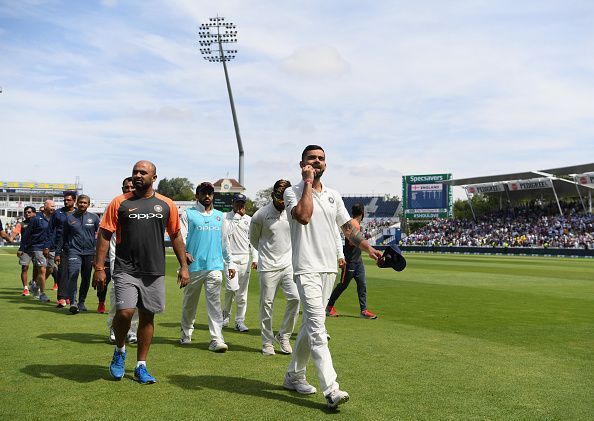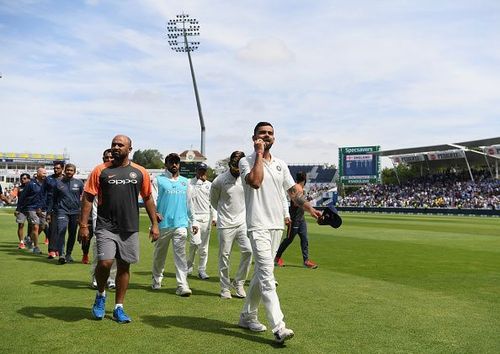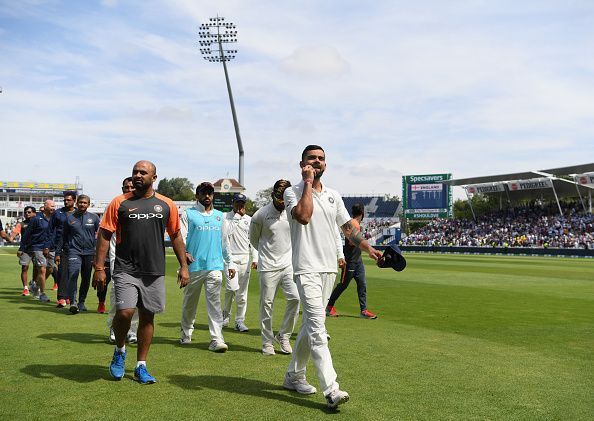
What went wrong for Team India at Edgbaston?

It was once again the familiar story for the Indian Cricket Team at Edgbaston Cricket Ground, Birmingham, against England in the recently concluded first Test match. It was so near and yet so far for India at Edgbaston. Even if the margin of defeat by 31 runs did not reflect the severity of the defeat, it did bring to light the technical flaws and miscalculations that led to that defeat.
Here is a look at the reasons for India’s poor performance at the Edgbaston Test.
1. First Test Match Syndrome
If you examine India’s overseas performance in the recent past, they invariably lost the first Test match of an overseas trip. The reason was mainly due to the failure on the part of the batsmen to adapt to the overseas conditions quickly.
The only exception to this syndrome being India’s last tour of England in 2014 where India had a perfect start holding on to a draw in the first Test and then managing to win the second Test. Thereafter, India inexplicably lost the plot and the stomach to fight and went down 3-1 in that five-match Test series.
2. Lack of match practice to main players
Coming into the first Test, main players like Murali Vijay, Dinesh Karthik, Ajinkya Rahane and Mohammed Shami did not have adequate match practice in England to get acclimatized to the conditions.
The form of Chateswar Pujara in county matches was not at all encouraging to warrant a place in the playing XI. Besides Kohli and Dhawan, the only other batsman who was in form in the T20s and ODIs was Rohit Sharma, who was back home even before the Test series started.
3. Wrong composition of the team
Before the Test match started, India faltered badly in team selection on two counts one was to include Shikhar Dhawan in place of Chateswar Pujara and another was the inclusion of Hardik Pandya in place of Kuldeep Yadav. As it turned out, Shikhar Dhawan was a sitting duck waiting to offer catch practice to the opposition slip cordon. In hindsight, Pujara could have provided the much-needed stability and calmness in the middle order.
Kuldeep Yadav had a psychological edge over the England batsmen in the T20s and ODIs and he should have been selected ahead of Hardik Pandya. India should have exploited England’s traditional weakness against wrist spin.
4. Butterfingers at the slip cordon
Both the teams were guilty of dropping too many dollies in the slip cordon. Virat Kohli, who was dropped on 21 in the first innings, went on to score 149 runs in the end. For England, Dawid Malan dropped as many as 4 catches and India’s Shikhar Dhawan was not far behind in that regard.
In spite of dropping so many catches costing too many in terms of runs, England still managed to be on the right side of the result. Sadly for India, it has cost them the match. Dinesh Karthik’s scratchy presence behind the stumps was not at all inspiring to the fielding unit. Shikhar Dhawan ’s sheepish smile after every drop was annoying, to say the least.
5. Failure of the top order batsmen in both the innings
Apart from Virat Kohli, who scored more than 50% of the total runs scored by India in the match, none of the other batsmen had the stomach to fight it out in the middle. Shikhar Dhawan and K.L. Rahul had their technical deficiencies against the moving ball.
Murali Vijay, in his second tour to England, did not offer a shot in the second innings and got out to deliberate padding. Having enjoyed a life before, courtesy Dawid Malan, Murali Vijay should have known that in England the ball moves both ways. Ajinkya Rahane, equipped with the best batting technique to counter the English conditions, played a loose shot in the second innings when he should have stayed with Kohli.
In the first innings, the second highest score after Virat’s epic 149 was Shikhar Dhawan’s 26. In the second innings, it was Hardik Pandya who was the second top scorer with 31 runs after Kohli’s half-century. Ashwin, an able batsman on sub-continental pitches, flatter to deceive on alien conditions. This statistics sums up the lack of support for Kohli at the batting crease.
6. Choosing the wrong bowler to bowl at the wrong time
In England’s second innings, Ashwin opened the bowling with the new ball and took the first three wickets. On the third morning before lunch, one felt Kohli had over bowled Ashwin at the cost of Umesh Yadav. On that day, the overhead conditions were conducive for fast bowling and Umesh Yadav, more of a wicket to wicket bowler, was brought on to the bowling crease only after lunch.
A bit of Umesh Yadav before lunch in place of Ashwin could have titled the match decisively in favour of India. Again, when England were 87 for 7 immediately after lunch, Ashwin could have been brought on to bowl to the left-hander Sam Curran. But he was brought on only after Sam Curran was well settled. Aside of these few slip-ups, Kohli was spot on with his bowling changes.
7. Allowing the England tail to wag
This has been the perennial problem for India for so long. The last three wickets for England added more than 100 runs in the second innings which proved to be the difference in the end. Sam Curran’s 63 runs in the second innings was the turning point of the match.
Though India managed to add 100 runs with the last 2 wickets in the first innings, it was the presence of Superman Virat Kohli which made that possible. However, England lost their first seven batsmen in the second innings and precariously placed at 87 for 7 before the tail was allowed to wag.
With England on 87 for 7 in the second innings and with an overall lead of barely 100 runs, it was India’s match to lose from thereon and they did exactly the same.
8. Resistance to shuffling of the batting order in the second innings
India, in their pursuit to chase 194 for victory, could have experimented with a few changes in the batting line up in the second innings. Dinesh Karthik, with a sound technique and a busy player, could have been promoted to No 3 and Hardik Pandya, a naturally aggressive player, to No 5.
A little cameo from Hardik Pandya with plenty of wickets left in the shed could have put a lot of pressure on the England bowlers and could have reduced the target significantly. This would have enabled Rahane and Rahul to crawl to the target at the finishing leg.
Umesh Yadav, a better blocker than Mohamed Shami, should have been sent in place of Shami at the fall of Kohli’s crucial wicket. That would have allowed Hardik Pandya to go for the target with few more wickets in hand.
The only change India made in the batting order was the promotion of Ashwin to No 6 in the second innings which did not pay off. However, that move had saved Dinesh Karthik and Hardik Pandya to be made available for the last leg of the chase and they too failed to justify that move.
As such all captains are reluctant to tinker with the regular batting order in Test matches. A bit of flexibility in the batting order,r even in Test matches, would produce the desired results.
9 Missing key bowlers owing to injury
India sorely missed Bhuvneswar Kumar and Bumrah due to injury. Shami, Ishant and Umesh Yadav are all similar type of hitting the deck bowlers. They look stunning when they keep on beating the outer edge of the bat with pace failing to catch the edge.
A bit slower swing bowler like a Bhuvneswar Kumar perhaps induce such edges resulting in wickets. When England were 87 for 7 in the second innings, India badly missed the yorker specialist Bumrah who could have polished off the tail with his accurate yorkers.
Ironically for England, they missed their regular fast bowler Chris Woakes who was a certainty in the playing XI. However, it was a blessing in disguise for them as his replacement Sam Curran, playing only in the second Test match, grabbed that opportunity and turned the match upside down.
Losing the first match of a five-match Test series is not the end of the world for India. No Asian team has ever won a Test match at Edgbaston and India is no exception to that. Cricket, as in life, teaches a lot in times of adversity and failures. Hope the Indian Cricket team learn from this defeat and turn it around in the next T

e
st match.